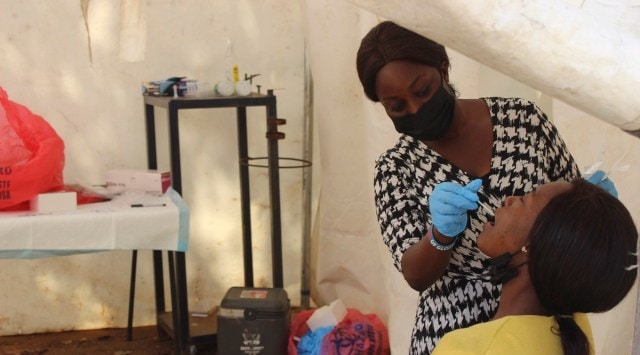SOUTH AFRICAN health authorities have conveyed to top medical experts in India that they are witnessing “very low hospitalisation” directly linked to Omicron, although the new Covid variant of concern is “highly transmissibile” and patients are experiencing extreme fatigue even with mild disease, The Indian Express has learnt.
The latest update came even as the World Health Organisation (WHO) assessed global risk from the newly discovered variant as “very high”, and India extended support to countries dealing with Omicron in Africa, and promised supplies of Made-in-India vaccines.

Top Government sources told The Indian Express that experts from the Indian Council of Medical Research (ICMR) and National Centre for Disease Control (NCDC) held a detailed exchange with South African authorities on Omicron, including the transmissibility and severity of infection.
Story continues below this ad
Sources said South African experts conveyed that Omicron has been found to be highly transmissible when compared to Delta, the predominant variant currently circulating in India. “Based on the exchange, we also know that very low hospitalisation is linked to the variant so far,” sources said.
Significantly, the South African experts have informed that Omicron has not resulted in any deaths, as of now. “So far, it only manifests in the form of mild disease with extreme fatigue and throat irritation being the predominant symptom,” sources said.
The South Africans also highlighted that patients are not experiencing loss of sense, smell and taste as reported in other variants, or drop in oxygen levels as reported in the Delta variant. “At this point, based on the exchange, we are not panicking. We have to wait for a few more days on what happens. But if anything untoward happens, they will share with us,” sources said.
In Delhi, meanwhile, the Ministry of External Affairs (MEA) said in a statement that India expresses “solidarity with the countries, particularly in Africa, who have so far been affected by the Omicron variant”.
Story continues below this ad
It said that the Government “stands ready to support the countries affected in Africa in dealing with the Omicron variant, including by supplies of Made-in-India vaccines”.
“Supplies can be undertaken through Covax or bilaterally. In this regard, the Government has cleared all orders placed so far by Covax for supplies of Covishield vaccines, including to African countries like Malawi, Ethiopia, Zambia, Mozambique, Guinea and Lesotho. We have also cleared supplies of Covaxin to Botswana,” the MEA said.
“Any new requirement projected either bilaterally or through Covax will be considered expeditiously,” it said.
The Government also said that it is ready to supply life-saving drugs, test kits, gloves, PPE kits and medical equipment, such as ventilators. “Indian institutions would favourably consider cooperation in genomic surveillance and virus characterisation-related research work with their African counterparts,” the statement said.
Story continues below this ad
India has, so far, supplied more than 25 million doses of Made-in-India vaccines to 41 countries in Africa, including nearly one million doses in the form of grants to 16 countries and over 16 million doses under the Covax facility to 33 countries.
On Sunday, the WHO had said that it is not yet clear whether infection with Omicron causes more severe disease compared to other variants, including Delta.
Later, in a new technical brief circulated to countries, it said there were “considerable uncertainties” in information about Omicron, but preliminary reports suggest a potential for “increased risk” from this variant.
“Given mutations that may confer immune escape potential and possibly transmissibility advantage, the likelihood of potential further spread of Omicron at the global level is high… The overall global risk related to the new VoC (variant of concern) Omicron is assessed as very high,” the WHO said.
Story continues below this ad
“There is substantial uncertainty regarding Omicron’s transmissibility, immune escape potential (from either infection or vaccine-induced immunity), clinical presentation, severity of disease and response to other countermeasures like diagnostics and therapeutics,” it said.
“Depending on these characteristics, if another major surge of Covid19 takes place driven by Omicron, consequences may be severe. Increasing cases, regardless of a change in severity, may pose overwhelming demands on healthcare systems and may lead to increased morbidity and mortality,” it said.
The WHO, however, said that no Omicron-related death had been reported from anywhere in the world.
The warning came on a day when infections by Omicron spread to newer countries and regions. Scotland reported six cases, while Portugal reported 13 cases. Two cases were detected in Canada as well, while Australia reported two more cases to add to the two that were detected earlier.
Story continues below this ad
The number of confirmed infections by the Omicron variant is now over 150, with at least 15 countries or regions having detected this variant till now. —(With ENS/Pune)










